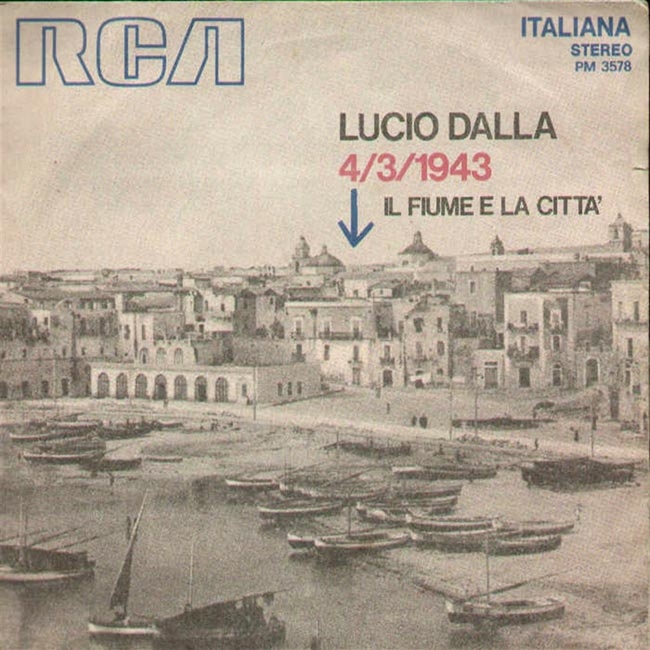4/3/1943

(Lucio Dalla-Paola Pallottino) – Lucio Dalla, 1971
One day, at the beginning of 1970, Lucio showed me two texts that had been sent in an envelope by a lady from Bologna. Envelopes such as these would often arrive in the offices of record companies, or reached singers in person. Basically, they always ended up in the waste paper basket. But that one didn’t. And it changed Lucio Dalla’s future, turning him from an elitist interpreter into a popular success phenomenon. One of the two texts was titled Gesù Bambino [Baby Jesus] and the other il Gigante e la bambina [The giant and the little girl]. The author was called Paola Pallottino, from Bologna, the daughter of an important etruscologist, as we later discovered. She was, and remained, a great illustrator of children’s books. To cut a long story short, Lucio got down to work and in two hours he put the music to the two pieces. The lyrics stayed intact. Or rather they would have remained intact if it hadn’t been for a fateful Sanremo Festival.
But let’s take this one step at a time. Lucio conceives two perfect, beautiful music scores. Our only problem was how to produce Gesù Bambino. We recorded seven or eight demos with different arrangements. The greatly missed Ruggero Cini arranged it as a march, a fado, a country number. One day Lucio comes up with the idea of having the initial riff played by the violinist from my brother’s band, Renzo Fontanella, who was there for some reason. The whole thing sounds like a folk ballad, and we decide that it’s OK. RCA listens to the work and decides to present Lucio at Sanremo. At that time the Festival was taken over by the record companies: as Dalla was not a big name, the selection committee would have gladly ignored him, but thankfully, our dear friend Piero Vivarelli, who was a member, simply refused to exclude the song and said, “I am not signing the report, and I’ll create a scandal. It cannot be eliminated, it is one of the most beautiful songs!” He was adamant, so Gesù bambino was admitted, but the ordeal was not over.
TV censorship began, which required substantial changes to the lyrics. First of all the title: it could not be entitled Gesù bambino as it would have been kind of sacrilegious, so it was entitled 4/3/43, Lucio’s date of birth. Then several changes were made that debased the content: “she posed as the virgin Mary” became “posed as a woman”, “to the thieves and the whores I am Baby Jesus” became “for the people of the port […]” or “while I swear and drink wine” became “while I play cards and I drink wine”. “Listen Lucio,” I said at one point, “forget it, they broke our balls, we are not going to the Festival, and that’s all!” He told me “No, I am going to go because I believe in this piece, I’m going no matter what….”. As it turned out, 4/3/43 came third, but was the moral winner of the festival. And it was pandemonium. It became immediately clear that something new had happened, the short man with glasses and the beret was no longer a joke, but the symbol of a revolution that was rocking the temple of tradition. Lucio overwhelmed everyone, even the members of Equipe 84, who sang with him and were, at least on paper, the real stars. Finally he had scored a great success. And at that point Dalla became the point of reference for the new Italian music. Also the other piece by Pallottino, Il gigante e la bambina, brought luck to Ron, who decisively achieved success at the Disco per l’Estate of that year.
Quoted from: Bardotti, Sergio, In via dei matti numero zero, Roma, Edizioni Associate, 1997, pp. 35-37
